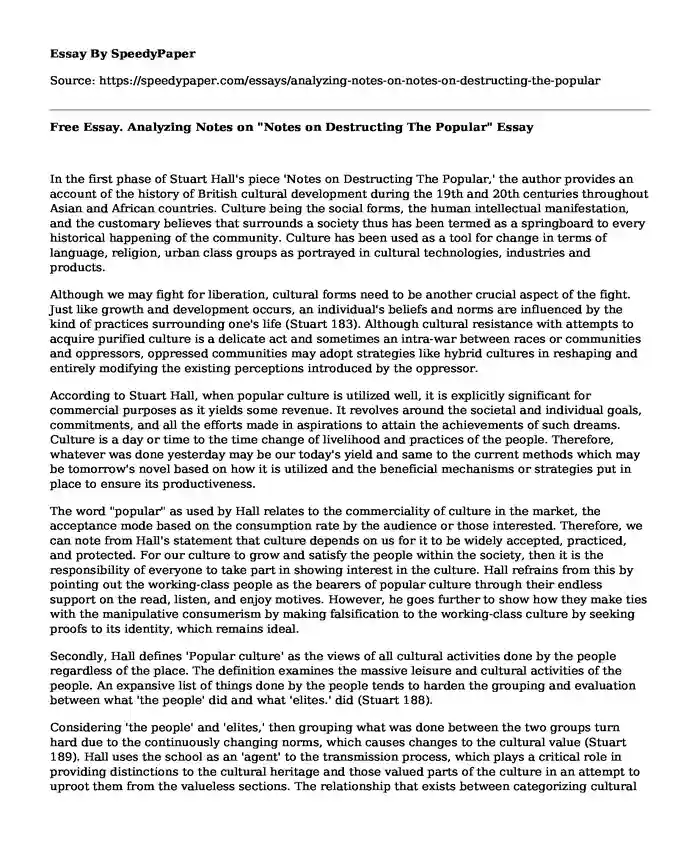In the first phase of Stuart Hall's piece 'Notes on Destructing The Popular,' the author provides an account of the history of British cultural development during the 19th and 20th centuries throughout Asian and African countries. Culture being the social forms, the human intellectual manifestation, and the customary believes that surrounds a society thus has been termed as a springboard to every historical happening of the community. Culture has been used as a tool for change in terms of language, religion, urban class groups as portrayed in cultural technologies, industries and products.
Although we may fight for liberation, cultural forms need to be another crucial aspect of the fight. Just like growth and development occurs, an individual's beliefs and norms are influenced by the kind of practices surrounding one's life (Stuart 183). Although cultural resistance with attempts to acquire purified culture is a delicate act and sometimes an intra-war between races or communities and oppressors, oppressed communities may adopt strategies like hybrid cultures in reshaping and entirely modifying the existing perceptions introduced by the oppressor.
According to Stuart Hall, when popular culture is utilized well, it is explicitly significant for commercial purposes as it yields some revenue. It revolves around the societal and individual goals, commitments, and all the efforts made in aspirations to attain the achievements of such dreams. Culture is a day or time to the time change of livelihood and practices of the people. Therefore, whatever was done yesterday may be our today's yield and same to the current methods which may be tomorrow's novel based on how it is utilized and the beneficial mechanisms or strategies put in place to ensure its productiveness.
The word "popular" as used by Hall relates to the commerciality of culture in the market, the acceptance mode based on the consumption rate by the audience or those interested. Therefore, we can note from Hall's statement that culture depends on us for it to be widely accepted, practiced, and protected. For our culture to grow and satisfy the people within the society, then it is the responsibility of everyone to take part in showing interest in the culture. Hall refrains from this by pointing out the working-class people as the bearers of popular culture through their endless support on the read, listen, and enjoy motives. However, he goes further to show how they make ties with the manipulative consumerism by making falsification to the working-class culture by seeking proofs to its identity, which remains ideal.
Secondly, Hall defines 'Popular culture' as the views of all cultural activities done by the people regardless of the place. The definition examines the massive leisure and cultural activities of the people. An expansive list of things done by the people tends to harden the grouping and evaluation between what 'the people' did and what 'elites.' did (Stuart 188).
Considering 'the people' and 'elites,' then grouping what was done between the two groups turn hard due to the continuously changing norms, which causes changes to the cultural value (Stuart 189). Hall uses the school as an 'agent' to the transmission process, which plays a critical role in providing distinctions to the cultural heritage and those valued parts of the culture in an attempt to uproot them from the valueless sections. The relationship that exists between categorizing cultural practices and evaluating the domain is what Hall considers as being essential in making discrepancies to the list of cultural activities.
Hall focuses on and favors the dynamic view of popular culture as being reliant on the different social force struggles made and the progressive changes in the field of culture (Stuart 189). This description appears towards the end of the essay, where the author views popular culture as an outgoing and continuous gradual process that keeps changing. Just like Gramsci and Hegemony asserts in their concept, constant shifts result in the subordination and control of some values as well as the gain or loss of certain cultural forms.
The definition treats integration and transition as a process based on its articulation in the dominant culture. Other emphasis provided by this definition includes; the correlation of cultural interpretation in continuous tension, the subordinate and dominant relationship, and further examines the hegemony question (Stuart 192). Different classes provide roots to each part of popular culture, which is more realistic; many things become popular based on how the dominant group pushes them on the mass. Hall examines how culture and class are vitally linked according to the domain in which the struggle of the course takes place (Stuart 191). Although the definition heavily focuses on popular culture as being the struggle against the dominant class, the most benefiting class is powerful who runs companies that utilize popular culture to earn profits through support from the working classes.
Stuart Hall has played a significant role by examining the origin of popular culture and helping provide all facts related to the culture-based industry to help prevent prejudice in the industry by defining the complex ideas of popular culture.
Works Cited
Stuart, H. A., L. L. "Notes on Deconstructing 'The Popular'." People's History and Socialist Theory, London, Routledge & Kegan Paul (1981): 227-249.
Cite this page
Free Essay. Analyzing Notes on "Notes on Destructing The Popular". (2023, Mar 29). Retrieved from https://speedypaper.net/essays/analyzing-notes-on-notes-on-destructing-the-popular
Request Removal
If you are the original author of this essay and no longer wish to have it published on the SpeedyPaper website, please click below to request its removal:
- Communication between doctor and patient
- Life Through a Midwife's Eyes - Free Essay on A Midwife's Tale
- Essay Sample on The Adventures of Robin Hood Movie
- Research Paper Example: IMF and World Bank on Malaysia
- Speech Paper Sample: Why We Should Go to College
- Essay Sample: Preferred Name and Pronoun for Transgender Students
- Essay Sample on the Self-Determination Theory
Popular categories





